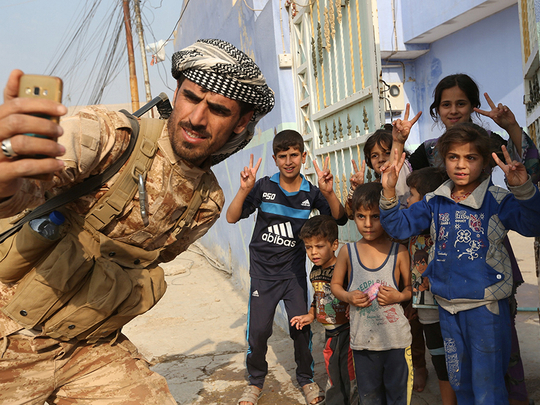
Dubai: Daesh forces in Iraq have abducted tens of thousands of men, women and children from areas around Mosul and are using them as “human shields” in the city as Iraqi government troops advance, the UN human rights office said on Friday.
The hardline militants killed at least 232 people on Wednesday, including 190 former Iraqi troops and 42 civilians who refused to obey their orders, UN human rights spokeswoman Ravina Shamdasani said.
“Credible reports suggest that [Daesh] has been forcing tens of thousands of people from their homes in subdistricts around Mosul and have forcibly relocated numbers of civilians inside the city itself since the operation began on October 17 to restore Iraqi government control over Mosul,” Shamdasani told a briefing.
This was to “use them as human shields, to be able to keep them close to military installations ... to try to frustrate the military operation against them”, she said.
Nearly 8,000 families, of roughly six people each, were abducted in subdistricts including Shura, she said.
“Daesh’s depraved cowardly strategy is to attempt to use the presence of civilian hostages to render certain points, areas or military forces immune from military operations, effectively using tens of thousands of women, men and children as human shields,” Shamdasani said.
“Many of those who refused to comply were shot on the spot,” she said.
The reports, from people who have fled as well as aid groups, have been corroborated by the United Nations, she added.
Iran-backed Iraqi Shiite paramilitary groups are about to launch an offensive on Daesh positions west of Mosul, assisting in the military campaign to take back the city, a spokesman said on Friday.
UN High Commissioner for Human Rights Zeid Ra’ad Al Hussain has voiced deep concern at reports that some individuals in the areas south of Mosul have “embarked on revenge killings and have vowed on television that there would be ‘eye-for-eye’ revenge against those who sided with Daesh”, Shamdasani said.
“Some people say that ‘I saw this man coming, and he killed my father, so I couldn’t resist, I had to exact revenge’, she said.
Some villagers have been prevented from returning to their villages due to their perceived support of Daesh, she said.
Government screening is in place to check people fleeing Mosul but the process must be carried out in humane conditions respecting international standards, Shamdasani said.
“Captured [Daesh] fighters and those perceived to have supported them must be treated fully in accordance with international law and held accountable for their crimes by properly constituted tribunals.”
Thousands of Kurdish Peshmerga fighters are taking part in the operation alongside Iraqi government troops and Kurdish leaders have made clear that they will expect payback once it has been successfully completed.
The Kurds, who have expanded the territory under their control far beyond the boundaries of their long-standing autonomous region in the north, say their hopes of a new Iraq have been dashed and they will now explore a separate future.
“As soon as Mosul is liberated, we will meet with our partners in Baghdad and talk about our independence,” said the region’s prime minister Nechirvan Barzani.
“We are not Arabs, we are our own Kurdish nation ... At some point, there will be a referendum on the independence of Kurdistan, and then we will let the people decide,” he told Germany’s Bild newspaper.
But for now, the battle for Mosul is far from over, and most of the advancing forces are still some way from the city limits.
— With inputs from agencies












